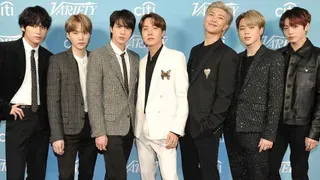February 18, 2011
Crossing Divides :: Joanne Herman on Leadership and Explaining the Trans Experience
Kilian Melloy READ TIME: 9 MIN.
LGBT business organization the Greater Boston Business Council hosted an awards ceremony last month than honored Mayor Thomas Menino, the Boston Gay Men's Chorus, and transgender equality advocate Joanne Herman, among others.
Herman, who transitioned in 2002, is the author of the book Transgender Explained for Those Who Are Not. She is also a blogger for the Huffington Post and, as of last September, the legally married wife of Theresa Fallon. The couple celebrated their wedding at Old South Church, where Herman is a member of the congregation-the first transgender member, as her website notes.
EDGE happened to be at the GBBC event with the Boston Gay Men's Chorus, which received the GBBC's Community Service Award. The Chorus performed at Herman and Fallon's wedding last fall. By chance, this correspondent was at Herman's table at the GBBC event.
When accepting the GBBC's Individual Service Award, Herman spoke of being an openly transgender professional and hoping to inspire other successful transgender individuals to emerge from the closet. Herman wasn't simply delivering words; her life is an example of what she was calling for. Herman is on the board of The Point Foundation, which provides scholarships, leadership training, and mentoring for promising LGBT students nationwide.
Herman is also a supporter of the Boston-based LGBT Aging Project, and, through that organization, of last year's critically-acclaimed documentary Gen Silent, which examines the challenges faced by aging LGBTs, some of whom were leaders at the forefront of the equality movement. In short, Joanne Herman is the sort of person who knows what needs to be done and where she needs to go--and then goes there and gets it done.
EDGE seized the chance to arrange for a conversation with Herman. A few weeks later, Herman and this correspondent completed an interview--coincidentally on the same day that Gov. Deval Patrick issued an executive order providing anti-discrimination protections to Massachusetts state workers, protecting them from bias based on gender identity and expression.
EDGE: What's your response to Gov. Patrick's action today to protect trans state employees?
Joanne Herman: I'm delighted that Governor Patrick has signed an executive order barring discrimination against Massachusetts state transgender employees, though I am not surprised by it. The Governor has been a strong supporter of transgender anti-discrimination protections for a while now.
What I am surprised by is the difficulty we are having getting similar protection for all transgender employees in the Commonwealth, the first state in the nation to allow same sex marriage and the second state to protect gay employees against discrimination. These protections do not represent special rights for transgender people, but rather the same rights to employment, housing, and public accommodation that others enjoy. The delay in the legislature is based on misinformation by a small group of people, and that is inexcusable.
EDGE: Congratulations on being awarded the Individual Achievement Award by the Greater Boston Business Council last month!
Joanne Herman: Thank you. It feels really, really good. One of the things that I try to do is be visible in a business context to help show that transgender people are capable contributors, and it's really great to be recognized in that context. It feels terrific.
EDGE: Your website notes that you are the "first transgender person ever elected to the boards of the Point Foundation and Fenway Health." Is your participation in these organizations a matter of overall leadership? Do you see yourself as an activist?
Joanne Herman: I think it's both, actually. This journey started by getting involved with Gay and Lesbian Advocates and Defenders, GLAD. I was the first transgender person on their board, too, starting in 2004 and then stepping down last year.
What has been true with all three organizations is that by being the first transgender person on the board, I have played a role in educating board members on what it means to be transgender and giving them the opportunity to work alongside a transgender person and see that we're really not much different from other people. We have a lot of the same concerns. I've also been playing a role in terms of making sure that the policies that the organizations pursue are transgender-inclusive and transgender-friendly.
But I have another hat that I wear because I have a finance background. For all three organizations I have served on the finance committee. I am the treasurer for the Point Foundation and chair of the audit committee for Fenway, so I do contribute in a non-trans way, a more customary board role, also.
EDGE: You mentioned in your acceptance speech that one misconception people have is that transgender people are also gay, but that's not necessarily the case.
Joanne Herman: I'm coming to believe that it is a very important misconception that needs to be dealt with. In my particular case, I stayed attracted to women when I transitioned, so that means I went from living as a straight male to being a lesbian woman.
I'm very comfortable being in the LGBT community. It feels very much like home, and it's a very comfortable environment for me to be an advocate in. But for somebody who transitioned and changed orientations--and some of my good trans women friends are interested in men now--it's not the most comfortable environment. It's certainly a fairly unlikely place for a woman to meet a guy, and your involvement may send a confusing message to the men you want to meet in the outside world.
EDGE: You formalized your relationship with your wife, Theresa Fallon, at a beautiful wedding last fall. Congratulations on that as well!
Joanne Herman: Thank you so much. That's really probably one of the brightest moments in my life, and certainly an unexpected one.
When I transitioned in 2002, I was married to a woman who I'd met in 1974 and married in 1975, and who stayed with me through my transition, and who'd still be with me today except for the fact that she had terminal cancer. While she was helping me get establish in my new life as Joanne, I was also helping her deal with some very difficult health issues. Her name was Barbara. I was delighted to have had thirty years with an extraordinary woman, and when she passed away, I found myself feeling like, if that's all I get in life, then I did pretty well.
So it was really quite a surprise and a delight to meet Terry on Match.com. We dated, with her fully aware that I was transgender; that didn't bother her at all. Now I'm a wife--again.
Challenges and Progress
EDGE: Many times, transgender individuals that they had a certainty from a very young age about their gender identity. Was that true for you as well?
Joanne Herman: For me it was around age seven. It's very, very common [for transgender people to realize their gender identity at a young age]. In fact, my most recent post on the Huffington Post talks about a study that has just come out that has pointed to the existence of many, many more transgender children than we currently know.
The study says that there are a lot of children who hide being transgender and don't reveal it until later in life, because all of the cues in the environment as a child say that being transgender is not acceptable. I think that's going to change in the coming years as there's more knowledge and awareness of transgender people.
But, back when I was seven I didn't know that I was transgender, and it seems now there were likely others in my elementary school class who didn't know, either. We didn't have any way to talk to each other and to exchange information.
EDGE: Is that starting to change now?
Joanne Herman: People are coming out younger and younger, as has been true of gays and lesbians for a while. It's starting to happen for transgender children, in part because there are now some resources for parents and parents are a little more aware. I won't say that the average parent is supportive, but we have some enlightened parents now who are willing to look a little bit further than just dismissing this our of hand.
We also have a treatment that is now available that really is groundbreaking. It started in the Netherlands, and it's now available at Children's Hospital in Boston. It involves delaying puberty to give more time to be absolutely sure that the child is transgender, and then if the conclusion is yes, you start cross-hormones without ever going through the wrong kind of puberty. What's wonderful about this is--for example, in my case, I went through male puberty and ended up with a lower voice than I would have otherwise, and I'm a little taller than might be the case for women. Maybe my hands are a little bigger. These are all called secondary sex characteristics that develop in puberty and that, when people see them, they immediately say, "Oh, you're this gender, you're that gender."
If as a transgender kid you can avoid going through the wrong kind of puberty, and once it has been determined that you are the other gender go through the right puberty, it makes your future life that much easier.
EDGE When transgender people make that transition, they often say that they feel at home in their bodies for the first time.
Joanne Herman: That's true in most cases. It's not that it's an easy road, and some people will encounter difficulties with their families; they might lose their job; they might lose their housing. There are a lot of consequences of transitioning that can really make life kind of miserable, but almost universally you'll find, if you talk to a person who has transitioned, the problem was not the transitioning of genders; that was the right thing to do. It's all the consequences of transitioning that are difficult."
EDGE What sorts of consequences did you face as you transitioned?
Joanne Herman: Well, it was a challenge for my family. Certainly, it was nothing that they knew anything about, or that they had any clue was coming. They reacted nervously, initially, and out of concern for my well-being. I think part of that experience was what drove me to publish the book, Transgender Explained for Those Who Are Not, and it's really the book that I wish I'd had to give to my family to introduce them to the existence of transgender people and to help them feel more comfortable with what I was going through.
EDGE In writing your book, what was the hardest thing to explain to your non-transgender readers?
Joanne Herman: That's a really good question, because there are a lot of things that are hard to explain... certainly, understanding that this is different from sexual orientation, as we were talking about before.
Also, this is the same sort of thing that happens when people come out as gay: explaining that this is not a choice, that the current belief is that this is something that is set in the womb, and that children don't realize it until elementary school.
I think that it's also a challenge to explain that there really are successful transgender people, and coming out doesn't mean throwing your life away--again, a common fear that parents might have when somebody comes out as gay. But we also have some very, very intelligent, very successful transgender people. You may not know about them simply because they are not very obviously transgender.
EDGE You mentioned in your speech at the GBBC event that part of your work is to encourage other transgender professionals to come out and be comfortable in public.
Joanne Herman: One of the things that was really unfortunate was that the treatment standards for transgender people used to say that you're not successful unless you go back into the closet. In other words, you transition from male to female and then you live your life as a women without ever letting on that you were at one point a male, or that you're transgender, or anything like that.
There are two problems with this. One is that there are certain people for whom that's a difficult challenge, because a lot of insurance companies and insurance plans don't cover the procedures that people need to go through in order to transition, and therefore people have to pay for it out of pocket. That makes [the physical transformation] only approachable for a small segment of the population. And even with those procedures, certain people are challenged in other ways. Women who are 6' 6" are very rare, and so as a transgender woman you would call attention to yourself if you were that tall.
The other problem is, by not being able to talk to each other, we suffered for a long time with not knowing that there are others like us, and that it was okay. It was also important for those around us to know that we hadn't lost our minds, that we can be good workers. In the battle for gay marriage, the battles that have been won, have been won by folks getting to know the gay couple next door. I think what we have to do now is help folks get to know the transgender person next door, and to realize that they are pretty much like you and me.
Kilian Melloy serves as EDGE Media Network's Associate Arts Editor and Staff Contributor. His professional memberships include the National Lesbian & Gay Journalists Association, the Boston Online Film Critics Association, The Gay and Lesbian Entertainment Critics Association, and the Boston Theater Critics Association's Elliot Norton Awards Committee.







